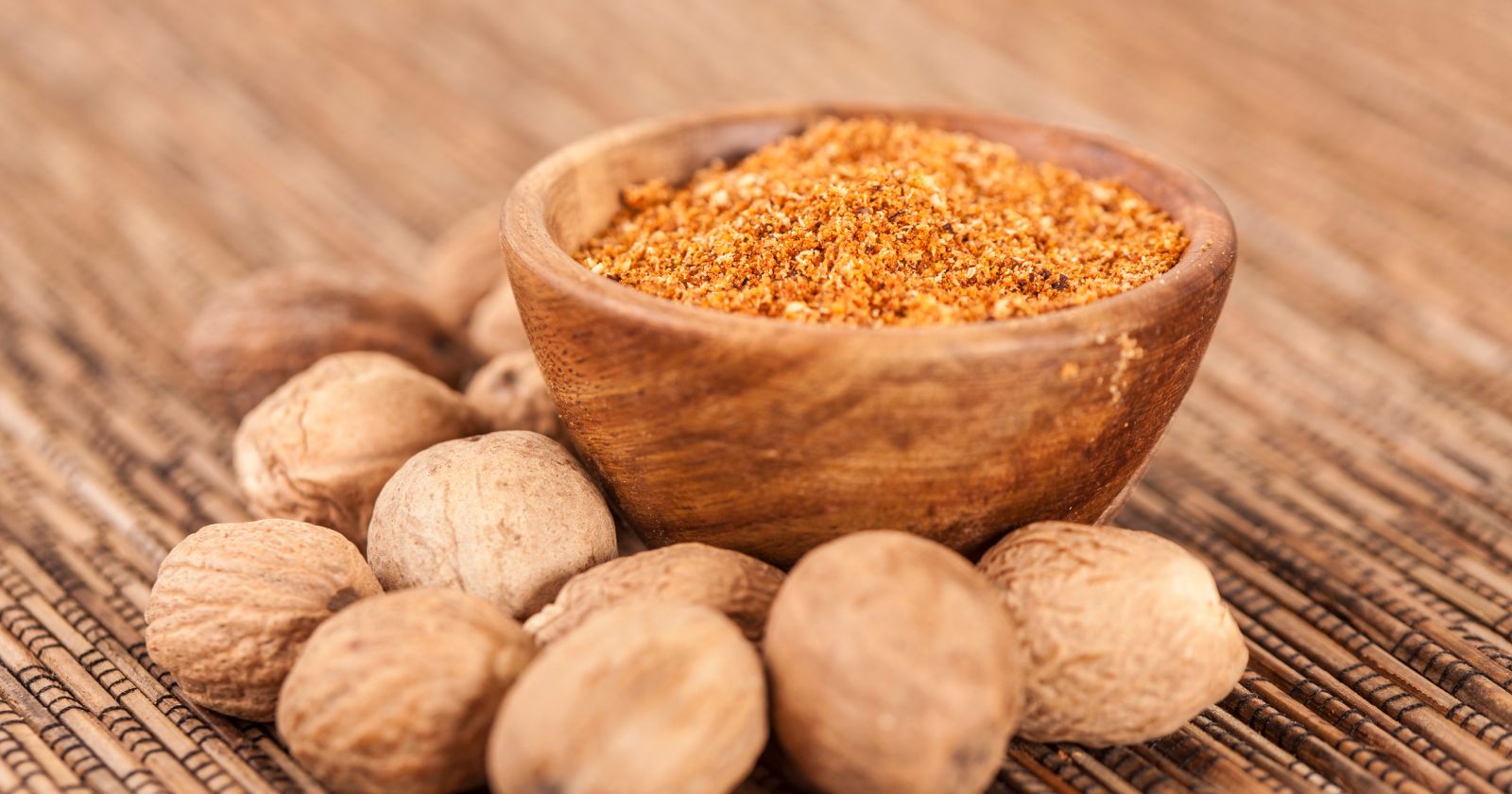Are you tired of using the same old spices in your cooking? Looking to add a unique flavor to your dishes? Look no further than nutmeg.
This versatile
In this article, we’ll explore nutmeg’s many uses and benefits in your kitchen and beyond.
What Is Nutmeg, And Why Is It A Secret Spice ?
Nutmeg is a
In the 16th century, nutmeg was a precious and traded commodity among European explorers, making it a secret
Nutmeg is often used in sweet and savory dishes, adding a unique depth of flavor to everything from soups and stews to custards and baked goods. But did you know that nutmeg is also believed to have some medicinal properties in addition to its culinary uses? Some of the potential health benefits of nutmeg include:
- Nutmeg contains compounds that may help boost brain function and memory.
- Nutmeg is high in antioxidants, which can help protect the body against oxidative stress.
- Nutmeg has anti-inflammatory properties, which may help reduce pain and swelling.
Of course, like with any
So, while nutmeg is a delicious and versatile
Nutmeg Varieties And How To Choose The Best One
Nutmeg is a
When choosing the best nutmeg, it’s essential to consider its freshness, weight, and appearance.
To ensure that you get the best quality nutmeg, buying whole nutmeg instead of pre-ground nutmeg is recommended. Whole nutmeg has a longer shelf life and retains its flavor and aroma better than the pre-ground variety.
Look for whole nutmeg that is heavy for its size, has a smooth surface, and is free from cracks or mold. These are signs that the nutmeg is fresh and of good quality.
Freshly grated or ground nutmeg has a more robust and intense flavor than dried and powdered nutmeg, making it ideal for baking and cooking.
However, both forms have their place in the kitchen, depending on the recipe and personal preference. If using dried and powdered nutmeg, it’s best to store it in an airtight container and use it within six months to maintain its freshness and potency.
When choosing nutmeg, it’s also worth considering the origin and variety of the
On the other hand, Bombay nutmeg has a milder and sweeter taste, making it ideal for desserts and beverages. Experimenting with different nutmeg varieties can add depth and complexity to your dishes and be a fun way to discover new flavors and aromas.
Nutmeg’s Culinary Uses In Sweet And Savory Dishes
Nutmeg is the ultimate
When it comes to savory dishes, nutmeg can be your secret weapon to add a touch of sweetness to pasta, rice, and vegetable dishes.
In Indian cuisine, nutmeg is used in
Besides adding flavor to dishes, nutmeg also has some health benefits. It contains antioxidants and anti-inflammatory properties, considerably boosting immunity and reducing inflammation. But be careful not to consume too much nutmeg as it can be toxic in large amounts. A small pinch gives your dishes a rich, warm flavor.
Let’s explore some of the dishes that highlight nutmeg’s flavor:
- Crème Brûlée: Nutmeg is often used in this classic dessert to add a hint of warmth and sweetness to the creamy custard. A sprinkle of nutmeg on the burnt sugar crust is the perfect finishing touch.
- Béchamel Sauce: Nutmeg is a crucial ingredient in this French sauce that is the base for many dishes, including mac and cheese. Nutmeg gives the sauce a unique flavor that complements the cheese and pasta.
- Carrot Ginger Soup: Nutmeg pairs well with the earthy flavors of carrots and the warm
spice of ginger, making it an ideal addition to this comforting soup. - Spinach and Ricotta Stuffed Shells: Nutmeg is used in the filling of this pasta dish to complement the flavors of spinach and ricotta. It takes the word to a whole new level.
Precautions And Side Effects Of Nutmeg Consumption
Consuming nutmeg in large doses can cause serious side effects, including hallucinations, nausea, dry mouth, dizziness, irregular heartbeat, agitation, and even death.
Long-term use of nutmeg in doses of 120 mg or more daily has been linked to hallucinations and other mental side effects.
Nutmeg might also cause sleepiness and slowed breathing when taken with sedatives. Other unpleasant side effects include vomiting, abdominal pain, headache, tremor, and chest pain.
Using nutmeg in moderation and following recommended dosages is essential to avoid these side effects.
To prevent the adverse effects of nutmeg consumption, take the following precautions:
- Use nutmeg in moderation and follow recommended dosages.
- People with liver disease, kidney disease, psychosis, or epilepsy should avoid using nutmeg.
- Pregnant or breastfeeding women should not take nutmeg.
- Do not take nutmeg with sedatives or medicines that affect the central nervous system.
- Nutmeg should not be used recreationally to avoid the risk of overdose and fatalities.
Nutmeg consumption can cause not only physical but also mental side effects. Here are some possible mental health side effects of nutmeg intake:
- Hallucinations: Nutmeg can cause hallucinations that can last for several days. It can be frightening and disorienting.
- Delirium: Nutmeg can cause delirium, characterized by confusion, disorientation, and agitation.
- Anxiety and panic attacks: Nutmeg can induce anxiety and panic attacks in some people.
- Depression: Nutmeg can cause depression and feelings of hopelessness.
In addition to physical and mental side effects, nutmeg consumption can also interact with other substances and medications, leading to adverse effects:
- Nutmeg should not be taken with alcohol or other drugs that can cause drowsiness or slow breathing.
- Nutmeg can interact with blood-thinning medications, causing an increase in bleeding risk.
- Nutmeg can increase the effects of drugs used to treat Alzheimer’s disease, Parkinson’s disease, and depression. It can also reduce the effectiveness of contraceptives.
Nutmeg Recipes To Try At Home
Nutmeg is a versatile
One popular recipe to try is Armenian Nutmeg Cake. This cake features a fragrant blend of spices, including cinnamon, cloves, and nutmeg. Another sweet treat to try is Nutmeg Cheesecake, which combines creamy cheese with nutmeg’s warm, comforting flavor.
Nutmeg Chicken is an excellent option if you’re in the mood for something savory. This dish features succulent chicken seasoned with nutmeg, thyme, and other spices. Another delicious dish is Sicilian Ricotta Pasta, which incorporates nutmeg into a rich and flavorful pasta sauce.
Whether you’re looking for sweet or savory, there’s sure to be a nutmeg recipe that suits your taste buds. Of course, there are many other nutmeg recipes to choose from.
Some other tasty options include Mexican Hot Chocolate, Cinnamon Sugar Pull-Apart Bread with Pumpkin and Spinach, and Pork Loin Braised in Milk.
Nutmeg Substitute
Are you looking for a substitute for nutmeg? Look no further than your
They all share warm, sweet flavors that mimic the essence of nutmeg. Whether you’re whipping up a dessert or a savory dish, rest assured that one of these substitutes will do the job.
- Ground mace is a popular substitute for nutmeg, as it comes from the same plant as nutmeg and shares a similar flavor profile.
- Cinnamon, meanwhile, offers a slightly sweeter taste, making it an excellent option for baked goods.
- Garam masala, a
spice blend often used in Indian cuisine, contains nutmeg and other warm spices like cinnamon and cardamom. This makes it a fantastic all-in-one substitute for nutmeg.
If those three options don’t fit the bill, consider trying pumpkin pie
These spices provide a warm, sweet flavor that can stand in for nutmeg. Pumpkin pie




